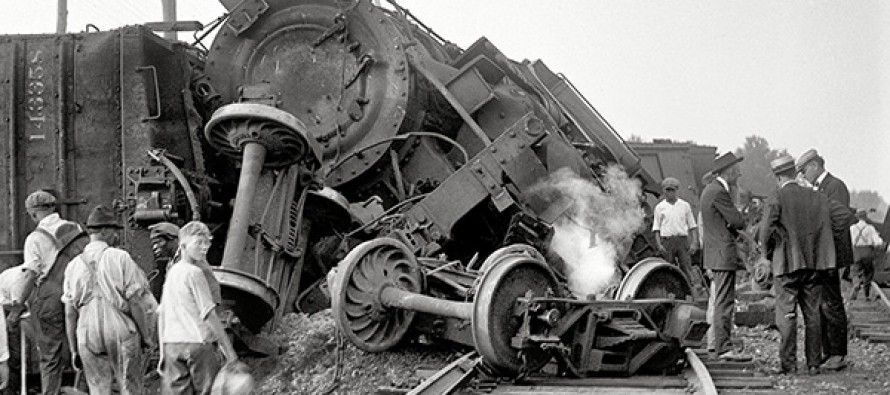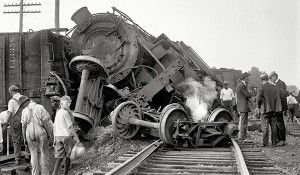Rail court decision could run over future bonds

 Is there a cow catcher on the front of the California high-speed rail project? One that pushes away future bond measures on everything from water to parks?
Is there a cow catcher on the front of the California high-speed rail project? One that pushes away future bond measures on everything from water to parks?
That’s the unasked question as voters head to the polls next Tuesday to decide the fate of Proposition 1, the $7.1 billion state water bond.
Earlier this month, the California Supreme Court green-lighted the state’s high-speed rail project. Although questions remain about the project’s long-term legal viability, as CalWatchdog.com reported.
But the ruling also cast a pall over other bond measures because it’s not clear how literally the exact wording of such measures must be interpreted. In a September argument to the court to stop the project, the Howard Jarvis Taxpayers Association argued, according to its website, “The current plan for high-speed rail is nearly twice as expensive as promised and the projected travel times and fairs have nearly doubled.”
In the wake of the court decision, the Jarvis President Jon Coupal brought up an new concern. He wrote on Oct. 26 that the court ruling “raises the specter that, no matter what a bond proposal promises about what will be built with the bond proceeds, those promises are meaningless. In other words, when California voters are asked to approve a bond, are they just approving debt for any purpose at all? This is the very definition of a blank check.”
As a result, he said, “the opponents of any bond proposal, at either the state or local level, need only point to High-Speed Rail to remind voters that promises in a voter approved bond proposal are meaningless and unenforceable.”
With just days to go before the election, Prop. 1 has mustered broad but probably shallow support for its massive expenditures. Although water policy has emerged as one area where legislators were able to find bipartisan ground this year, serious questions remain as to what voters will be approving with a Yes vote. And by some measures, those questions cannot even be answered until after the fact.
Spreading concern
Analysts and media reports have sounded alarms over Prop. 1’s deep ambiguity. The terms delimiting the high-speed rail project were clear and concise — although, as noted above, that didn’t matter much for the implementation.
But the language describing the scope and purpose of the water bond doesn’t even try to be precise, and is vague and uncertain from the get-go.
As the San Francisco Chronicle reported, opponents of the measure charge the bond’s language has been left vague “by design.”
The Chronicle agreed, concluding the “potential effects and implementation” of the big measure “are still hazy.”
Too late?
However, complex legal arguments are hard to press on voters, especially this lately in the election season.
Prop. 1’s bipartisan support also has muted opposition. Brown’s own re-election campaign largely has consisted of TV ads of him touting Prop. 1 and its companion, Proposition 2, the Rainy Day Budget Stabilization Act. It’s a calculated plan to emphasize his “good government” intentions, while ignoring his Republican opponent, Neel Kashkari.
The latest PPIC poll, taken a week ago, showed Prop. 1 spouting a high lead, 56 percent to 32 percent. It showed the proposition tied among Republicans, 43-43. But it enjoyed hefty support among Democrats, 68-20, and Independents, 56-23.
According to Ballotpedia, the Yes on Prop. 1 campaign has raised $13 million and spent almost all of it. The No on Prop. 1 campaign has raised only $89,100.
Future bonds
Where the Supreme Court decision on high-speed rail could come into effect is with future bond campaigns. Bonds usually pass. But in recent years two bonds have failed:
- 2000: Proposition 16, $220 million for crime labs.
- 2006: Proposition 81, $600 million for libraries.
Indeed, even Prop. 1A, the 2008 rail bond, passed with just 52.7 percent of the vote, 47.3 percent against. It’s unlikely it could pass today.
Prop. 1, after all, started out as a $11 billion water bond that twice was postponed by the Legislature, in 2010 and 2012, due to fears voters would drown it.
And all that happened before the Supreme Court certified that bond language is meaningless.
Related Articles
CA struggles to curb heroin spike
As loosening marijuana regulation and enforcement upends the drug culture in California, heroin use has become an increasing problem in
Explaining Obama
Sept. 6, 2012 By John Seiler I’m looking forward to President Obama’s acceptance speech tonight. I’m not a fan of
Dems Put Brakes on Budget Train Wreck
MARCH 28, 2011 By WAYNE LUSVARDI A new Field Poll found that a supermajority of Democrats has swung against tax increases



